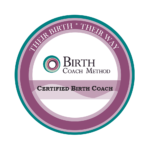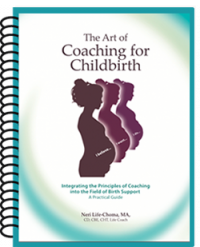
Evidence-Based Studies on the Side of Birth Support Coaching
Are there any studies about the benefits of coaching for health improvement?
While working on my new certification course, Coaching for Pregnancy and Birth, I researched studies that will provide the scientific data to support what I already knew – coaching provides the most beneficial strategies to lead expectant couples toward a healthy and satisfying journey of pregnancy, birth and early postpartum. I assumed that the best research strategy would be found in the field of health and wellness coaching, which has been growing rapidly over the years as more people have become conscious of their health and well-being, and guess what – I was right!
Exactly what do health and wellness coaches do?
If you wonder what a health and wellness coach does, let me explain.
Health and wellness coaches help clients make positive and lasting changes to their health. In an article called A Systematic Review of the Literature on Health and Wellness Coaching: Defining a Key Behavioral Intervention in Healthcare, published in Global Advances in Health and Medicine in 2013, the researchers analyzed medical literature on health and wellness coaching – 800 articles that were published in PubMed in which 76% contained empirical data about the topic. According to this comprehensive review, the literature shows a growing consensus about health and wellness coaching as “a patient-centered process that is based upon behavior change theory and is delivered by health professionals with diverse backgrounds. The actual coaching process entails goal-setting determined by the patient, encourages self-discovery in addition to content education, and incorporates mechanisms for developing accountability in health behaviors.
Sound familiar? That is exactly what birth support coaches are called to do too.
Birth Support Coaches lead expectant couples to set up clear goals for their desired birth, and we then inspire, inform, encourage and elicit our clients’ accountability for achieving it.
If you have been following my blog and listening to my webinars, you already know that this is exactly what birth support coaches are called to do. We use the same coaching strategies used by coaches in other fields. We lead expectant couples to craft their vision for their desired birth, and we then inspire, inform, encourage and elicit our clients’ accountability for achieving it. Since the experiences of pregnancy and birth fall under the broader category of maternal health, I figured that the findings supporting the benefit of health and wellness coaching would be applicable for coaching in the field of birth support.
Is there evidence to support applying health & wellness coaching techniques to birth support? Yes!
In a study called Comparing the Effectiveness of Individual Coaching, Self-Coaching, and Group Training: How Leadership Makes the Difference published in 2016 in Frontiers in Psychology, participants were assigned to either: individual coaching, a self-coaching, a group training, or a control group condition. The results indicated that individual coaching and group training were effective at facilitating goal attainment. Individual coaching created a high degree of satisfaction and was superior in helping participants to attain their goals, whereas group training successfully promoted the acquisition of relevant knowledge.
In addition, the findings show that the “coach’s transformational and transactional leadership behavior influenced participants’ perceived autonomy support and intrinsic motivation, resulting in beneficial coaching outcomes”.
So if you are a childbirth educator dedicated to leading expectant couples towards a healthy birth, these findings might motivate you to learn the coaching strategies that were found to be superior for informing and leading clients to attain their goals.
A different study called A Qualitative Study of How Health Coaches Support Patients in Making Health-Related Decisions and Behavioral Changes, published in Annals of Family Medicine in 2016, found that coach-patient relationships are beneficial in four aspects:
- education
- personal support
- practical support, and
- acting as a bridge between patients and clinicians.
The mutual trust and partnership that are central in coaching relationships were central to the coach’s ability to support the patient. A trusting relationship enabled patients to be honest, ask questions, and express doubts or disagreements, and that allowed the health coach to be more effective.
The coaching relationships were also found to be beneficial in facilitating the patient’s informed decisions: “Health coaches provided education using patient-centered techniques that included determining patients’ goals and readiness for change and checking for patients’ understanding…working with patients to identify options, create action plans, identify and overcome barriers, locate resources, and provide reminders. By providing this support, coaches enabled patients a wider range of choices.
Health coaches are embraced by the medical establishment as legitimate members of the patient’s team. That’s the goal for our birth support coaches too!
These findings are highly reassuring as to the importance of coaching in birth support since the issue of informed consent and advocacy in the field has raised a few dilemmas over the years and has led to lack of trust among everyone involved – medical care providers, support agents, and expectant couples.
Health coaches provided education using patient-centered techniques that included determining patients’ goals and readiness for change
In this particular study, health coaches were embraced by the medical as legitimate members of the patients’ team. This resulted in coaches feeling that they were creating a bridge between the patients and their caregivers. And this helped the patients feel like active partners in their care: “I think patients come in thinking they’re not part of the team. They’re just being told what to do. It’s a paradigm shift altogether. ‘Okay, I’m supposed to be part of this decision making.” It is my absolute vision to see the same thing happen in the field of birth support.
I wholeheartedly believe that when birth professionals begin coaching expectant couples it will enable the health system to recognize and embrace them as legitimate team members. It will resolve the dichotomy between the medical paradigm of maternal care and the traditional one and will evoke the new paradigm we are all hoping for- the patient-centered maternal care.
 BECOME A BIRTH SUPPORT COACH
BECOME A BIRTH SUPPORT COACH
If you are a birth professional (doula, prenatal yoga teacher, etc.) and wish to learn the same coaching techniques that health and wellness coaches have found to be so successful in their practices, only learn how to apply it coaching expectant couples, we invite you to enroll in our Coaching for Pregnancy and Birth Certification Course.
- Overshadowing the Transformative Essence of Childbirth with Data - July 10, 2024
- Navigating the Epidural Dilemma - May 28, 2024
- Informed Decision in Birth Support: A Myth of Empowerment? - April 29, 2024


